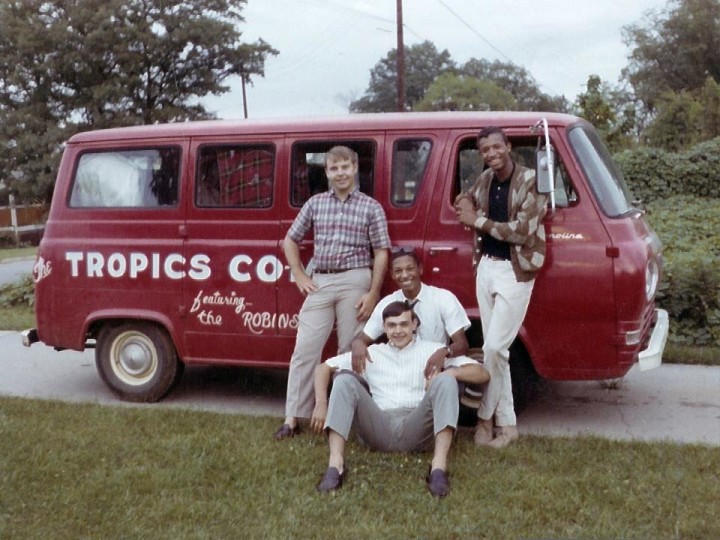
While not exactly a tropical paradise, the city of Eden was the birthplace of one of the best Soul bands of the sixties. This was before the towns of Leaksville, Draper and Spray merged to form Eden, which today has a population of less than 16,000. All three are nestled in Rockingham County, which gave rise to the Tropics through the merger of two bands: one from Reidsville and another from Leaksville.
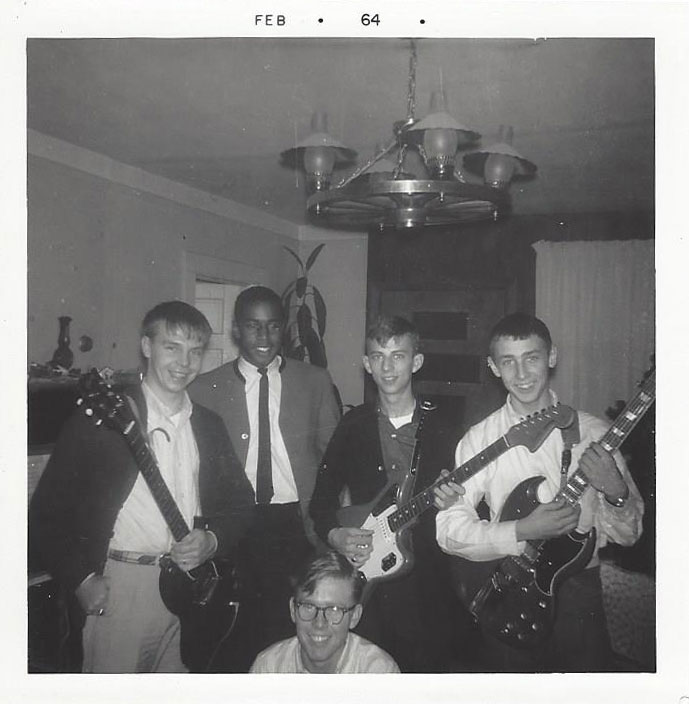
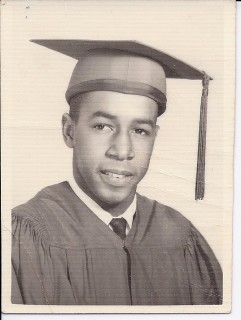
Guitarist Ken Adkins was visiting a girlfriend in Leaksville one night in 1960 when he cut through a black neighborhood to hitch the five-mile ride to his home in Draper. As he was passing by a church, Adkins was taken aback by a “terrifically great boogie woogie piano… Ray Charles-type stuff.” He crept up to the window and was peering inside when he was startled by the preacher, who came up from behind and asked if he’d like meet the pianist, a gifted black musician by the name of Malcolm Allen. The two bonded immediately and it wasn’t long before Adkins brought drummer Red White and bassist Ronnie Hooker into the fold.
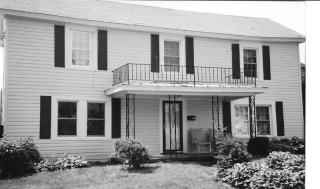
Allen recalls that their first practices were held in his home because the family had a piano in the living room. The then unnamed group quickly gained a following in the neighborhood and Allen says the front porch and yard of their home was often filled with people listening to their music. It wasn’t long before they began receiving requests to play in public.
A name was needed and Allen thought of The Tropics after seeing a commercial showing Jamaican musicians jamming on the beach. He explains that the group was billed initially as The Interracial Tropics “(so) people would know what they were getting and kind of eliminate some of the surprise factor.”
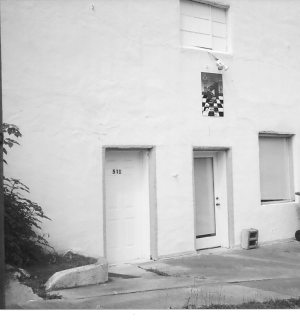
The four jammed and honed their skills at each other’s homes before landing their first gig at a black club, the Double Door Tea Room. Allen had cards printed for the occasion, advertising “The Interracial Tropics.” The Double Door was a small club in Leaksville that served Soul food on the ground level, with a small, open area on the second floor for live performances.
Allen explains that the “black community (was) more receptive and open to integration at that time” and “our guys were mostly into Soul and then Motown and blues, so the music kind of catered more to our people.” The crowd at the Double Door was on their feet cheering the soloists on, “hollering and raising sand, saying “go ahead, go ahead and play that thing!” Bolstered by the response, Allen says the band was encouraged “to branch out and go other places.”
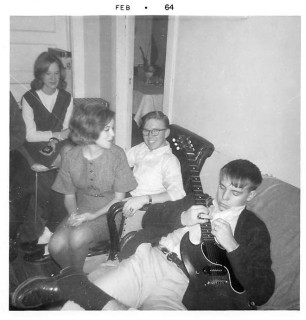
Dances followed at the segregated Stoneville High School. And while most of their friends were receptive to the mixed race band, Adkins recalls that “all (of our jobs) were for black audiences because white places would not book us.”
Red White says the country clubs in Virginia and North Carolina wouldn’t touch the band, but “we were accepted without equivocation (at the Double Door) and whites came to see us there. So it was really the beginning of the end of segregation as I knew it in my hometown.”
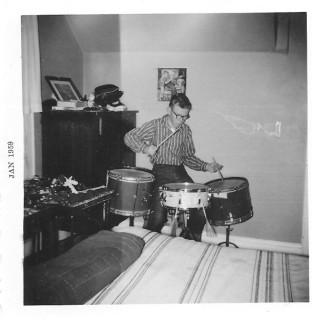
The band stuck close to home through 1961, when Adkins went away to school in Chapel Hill. They continued to play on weekends, when their paths crossed with another group of musicians from Reidsville who had a band. Mike Peters played bass in the Reidsville group, first known as the Bermudas (later as Rick and the Spirits) and remembers playing their first job at the Casville Volunteer Fire Department in Caswell County for $6 per man.
The decision was made to merge the two groups after Adkins moved to Reidsville. White drummed with the band for about two years before graduating high school in 1962 and joining the Air Force. The group recruited the drummer from the Reidsville band, Leonard Collins, who was equally adept on the skins.
Peters explains that the Spirits lost their guitar player, Rick Sealey, who left to attend college at East Carolina. Someone suggested Adkins and he agreed to come and play. Don Watkins played organ in the Reidsville band but quit when Adkins came on board. Ken brought Allen in to play keyboards and Peters replaced Hooker on bass. Joe Frank Myers played sax. Sealey attended college briefly before returning to the band, this time on keyboards.
Sealey’s return was short-lived. He was drafted in 1966 and replaced by Larry Wren on the Hammond B-3. Myers left and was replaced by Leo Caudle on sax. Caudle was a gifted saxophonist who “could play a tenor and alto sax at the same time out of both sides of his mouth.”
Allen played with the band for several years but came to a crossroads when he married and the couple had a young daughter. His job required that he work nights and that made it impossible to continue road trips on weekends. But before leaving, he introduced the band to Jimmy and Arnold Robinson. “I met Jimmy because right after high school I was in Greensboro attending A&T State University,” says Allen, and “when they came into the group, they gave us a new dimension because they were some heck-of-a singers and they enabled us to do a lot of Motown stuff.” While not related, the pair shared the same surname, so the band billed them as the Robinson Brothers.
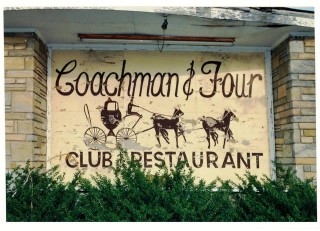
Kennedy booked the band throughout the East Coast. In addition to the Castaways clubs in Greensboro, Raleigh and Nags Head, the Tropics frequented the Embers Club at Nags Head; the Cellar in Charlotte; Coachman & 4 in Bennettsville; the Beach Club in Myrtle Beach; and the Pink Pussy Cat in Atlanta. They also played cotillion clubs, debutante balls and “just about every college in North Carolina.” The band performed “anywhere from Northern Virginia down to Atlanta, out west to Nashville.”
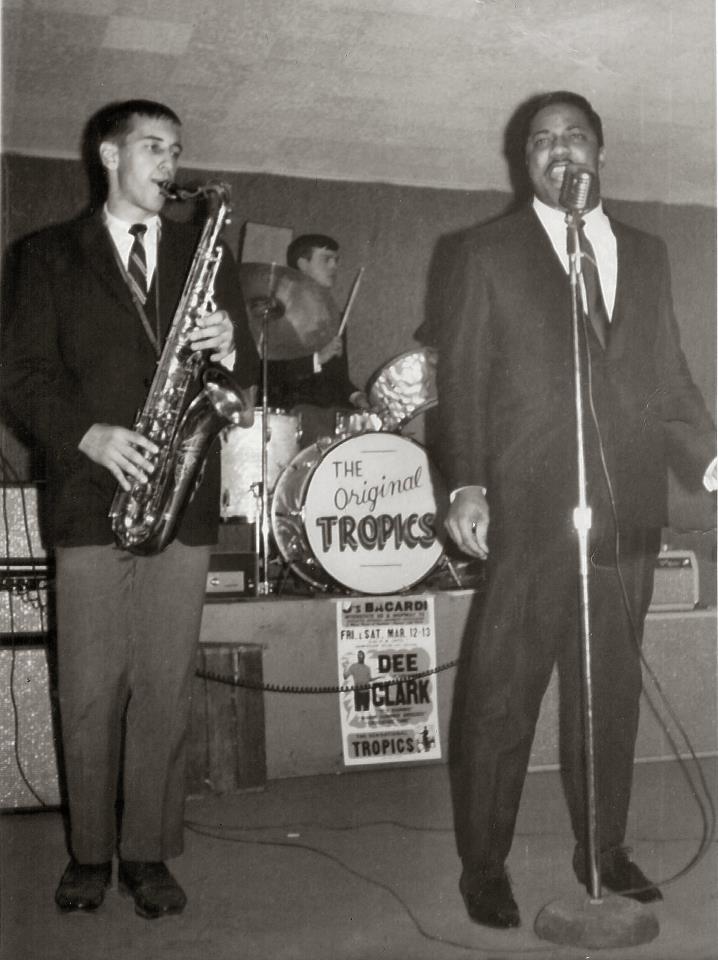
Their musical prowess became well known and the Tropics were soon in demand to back rhythm and blues recording artists. One of the first of those gigs was in support of Dee Clark, with the band later backing the Impressions, Martha and the Vandellas, Mary Wells, Rufus and Carla Thomas, Lee Dorsey, Major Lance, the Tams, Showmen and the Drifters.
Adkins says the band backed Dee Clark in late 1964 or early ’65 for two nights at J’s Bacardi in Durham. The Tropics already had two Clark songs in their repertoire, “Raindrops” and “Nobody But You,” and set about learning his other material, “so when he came to the show, we had his stuff down cold.” While they lacked the strings heard on Clark’s hits, Sealey was able to duplicate the arrangements note-for-note, recreating the background orchestration on the keyboards. Clark was impressed and would use the band again down the road.
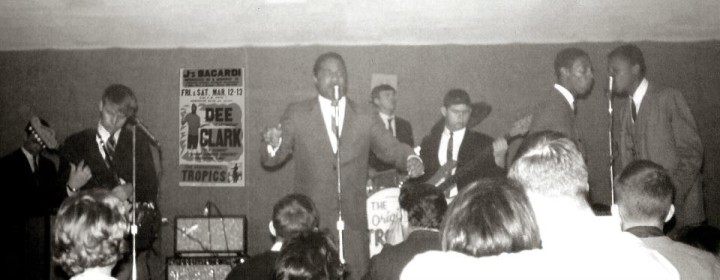
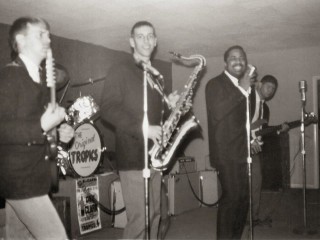
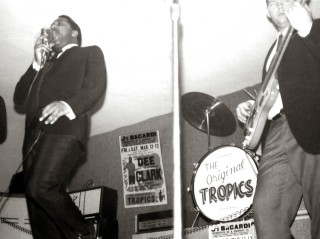
Rufus Thomas was a favorite of the Tropics and members would arrive hours before their shows and be entertained with non-stop jokes from the former Memphis DJ. The Tropics shared the bill with the Temptations on the BDG Quad at Washington and Lee University in Lexington, playing to 12,000 on a Saturday afternoon. An outdoor concert in Chapel Hill in support of Sam and Dave drew an even larger crowd.
But touring the segregated South with two black vocalists was a challenge. One night after a job the band stopped to eat at a restaurant in Eastern North Carolina. The Robinsons walked in with Adkins and Peters while the rest of the band slept on the bus. The waitress took their orders and emerged from the kitchen carrying just two plates, “gave them to Jimmy and Arnold and then looked at me and Mike Peters and said: ‘The law says we have to serve them, but it doesn’t say we have to serve you.” The four left the food on the table and walked out.
Another incident happened at the Jokers Three in Nags Head, where the band was playing a two-week summer engagement. The night before they were scheduled to leave, the club owner learned that the Klan had threatened a protest. He paid them in full and the band left the Outer Banks a day early.
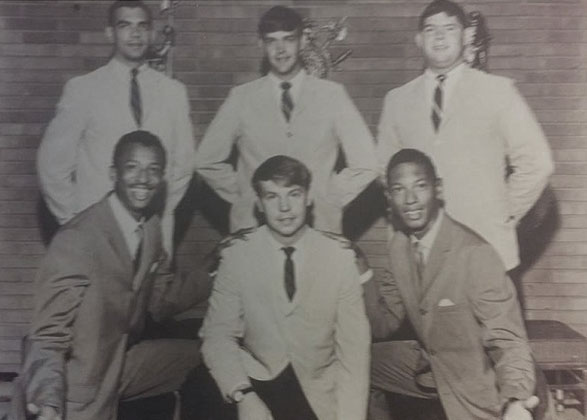
From left, top row: Rick Sealey, Leonard Collins, Mike Peters, bottom row: Jimmy Robinson, Ken Adkins, Arnold Robinson
An engagement at a large venue in Farmville, Virginia almost didn’t happen. Malcolm Allen says the band had reached their destination and the guys were unloading their equipment when the club manager spotted him and grabbed Adkins, asking if Allen were the band’s chauffeur. When the manager was informed that Allen was their organist, he responded, “not tonight.” Adkins didn’t hesitate, telling him that “if he don’t play, we don’t play.” Allen says the band was preparing to pack up their gear for the long trip home when the crowd started getting rowdy. Adkins turned to the owner and said: “Look, if you don’t get a band in here soon, they’re gonna trash your place.” The manager relented and allowed the band to take the stage, but glared at Allen and said: “I’m gonna keep an eye on you.” The Tropics brought the house down, especially when Allen tore up the keyboards on Ray Charles’ “What’d I Say.” When they finished their set, Allen approached the club manager and asked him how he was doing. He told him to keep playing and “when we got through, he gave me a tip, so I felt like that we broke a racial barrier… because it was just a segregated time.”
But the most disturbing incident happened at UNC in Chapel Hill. The band was playing a fraternity party on April 4, 1968, the night that Dr. Martin Luther King, Jr. was assassinated. Adkins recalls that the band was performing their first set when one of the fraternity brothers came up and asked to use a microphone. Adkins recalls that he told “his room full of partiers, frat boys and their dates that Martin Luther King had been shot.” The fraternity “erupted in cheering and applause, and it literally made me sick. It made Jimmy and Arnold sick and it made our whole band sick and it made me very sad for the students of the University of North Carolina.” The band stopped playing immediately, packed up their equipment and headed home.
Traveling with two black vocalists was not without its perks. Peters’ fondest memory is of the band’s two-week engagement in Myrtle Beach. The group decided to spend one week at the then black beach, Atlantic, and another at the white beach, Windy Hill. The first half of their stay found the Tropics sharing quarters with Norman Johnson and the Showmen, a scene Peters describes as a non-stop party. “You could get anything you wanted any time of the night,” he recalls, “and everybody stayed pretty much passed out the next day.” The week was “an adventure,” but the pace at Windy Hill was considerably quieter.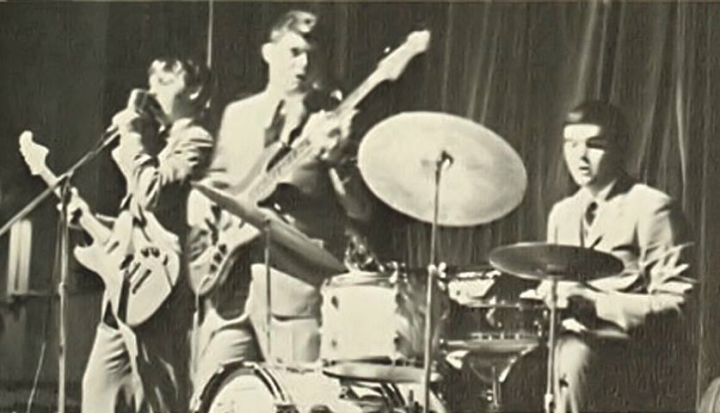
Shortly after backing Dee Clark in Durham, the Tropics traveled to Greensboro on March 15, 1965 to record a 45 at Copeland Studios. Adkins says it was an obvious choice since it was “there at our back door” and they knew owner Walt Copeland.
The group had rehearsed an Adkins’ original (“Hey You Little Girl”) in Peters’ basement and performed it live before the sessions, but were unprepared to record a flip side for the single. Their idea to simply repeat the backing track as an instrumental was quickly nixed by the engineer and Adkins proceeded to write “The Happy Hour” in 15 minutes. Peters recalls that the song was composed one night right after a rehearsal, adding: “(We) just did it to an old Curtis Mayfield run and put ‘The Happy Hour’ together.”
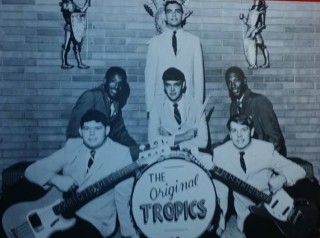
The unique finger snapping at the start of the song was Adkins’ idea. He explains that it was a way to get the band to start on cue without a counted introduction. Two guitar chords get the song into gear, followed by an unforgettable vocal interplay between Arnold and Jimmy. The song builds to a crescendo that Collins kicks to a close in just two-and-half minutes.
Sealey played piano; Collins was on drums; Peters and Adkins played bass and guitar, respectively; Arnold Robinson played the saxophone; and the Robinson Brothers shared lead vocal harmonies. The band provided background vocals. Peters was featured prominently, aided by a girl remembered only as Sandra. Jimmy sang the lead tenor part, while the baritone voice is Arnold’s. Jimmy also sings the lead on “The Happy Hour.”
Adkins explains that he “wanted to write something that was musically different” than other songs on the radio, so he incorporated “a couple of things to make that happen.” The most effective is in the vocal walk-up where they sing: “I’ll never love you and leave you alone.” Adkins says the “alone” passage “goes back to the dominant chord, which is ‘F.’ None of the songs that I’d heard to that point, actually went back to their final climax and got back to the final dominant chord. So doing that gave a lot of strength to the harmonies.”
The Robinsons’ vocal harmony was perhaps the band’s greatest strength. Both were exceptional singers and shared lead vocal chores on stage. While Arnold went on to perform professionally in the Nylons, Adkins says Jimmy was also an outstanding singer and the combination of their voices gave the Tropics “a Righteous Brothers vibe.” The two had “distinctly different voices” that blended perfectly. And while Jimmy left music after the Tropics, Adkins insists that he was also “an incredible singer,” who “was even more charismatic on stage than Arnold and did the majority of the lead vocal work.”
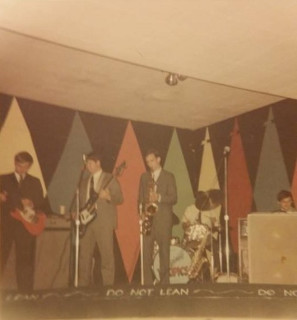
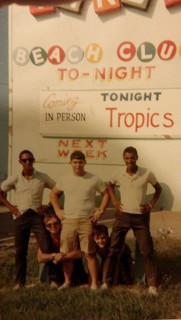
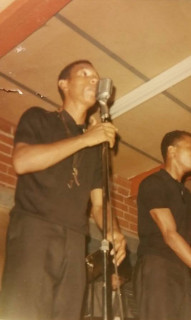
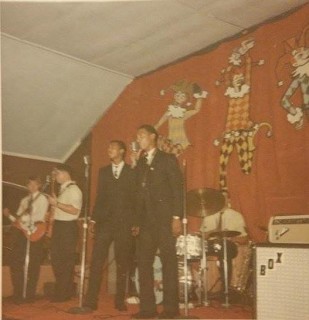
The Robinson Brothers gave the Tropics a smooth, professional “show band” performance with custom-made uniforms, elaborate choreography and humorous back-and-forth banter with the audience. The show would start with the band playing, followed by a big introduction to bring Jimmy and Arnold onto the stage. Theirs was the first group in the region to feature the star stage show that would become the norm a few years later.
Adkins says the Greensboro sessions lasted about two hours. The band had rehearsed the songs before entering the studio and committed both sides to tape in no more than three or four takes. The band performed flawlessly, except for one bad note hit by Sealey, which can be heard on the record. Copeland charged an hourly rate of $45 in 1965 and the total tab for the studio time came to $95, including the master tapes.
While at Copeland, the band recorded a jingle for Holsum bread, with Jimmy, Arnold, Ken and Mike adding vocals and background claps to the television commercial.
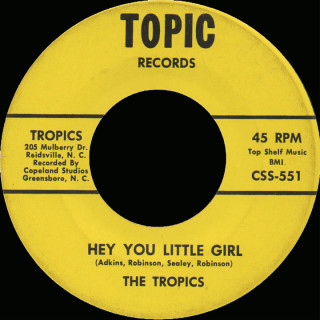 The 45 was a one-off pressing on Topic Records, which Adkins describes as his label. The name was chosen because of its similarity to the group’s, and because “it rhymed with Tropics.” Peters believes the 45 had a total run of 2,500 copies; however, Adkins recalls several pressings, noting the band “would order 1,000 at a time and sell them at our shows,” paying for the records as they were produced. Betty Sue Trent owned Trent’s Records in Reidsville and paid for the initial pressing, in exchange for copies of the disc. Besides Trent’s, the record was placed at mom-and-pop stores throughout the Piedmont, while the band also “did a fair amount of promoting,” taking them to dee jays and program directors in the Carolinas. That resulted in “a fair amount of play,” and Adkins recalls the song being in heavy rotation in Burlington, Greensboro, Reidsville and Charlotte. Stations across Eastern North Carolina also picked up the tune and Adkins remembers selling the final 1,000 copies a year after the song was recorded.
The 45 was a one-off pressing on Topic Records, which Adkins describes as his label. The name was chosen because of its similarity to the group’s, and because “it rhymed with Tropics.” Peters believes the 45 had a total run of 2,500 copies; however, Adkins recalls several pressings, noting the band “would order 1,000 at a time and sell them at our shows,” paying for the records as they were produced. Betty Sue Trent owned Trent’s Records in Reidsville and paid for the initial pressing, in exchange for copies of the disc. Besides Trent’s, the record was placed at mom-and-pop stores throughout the Piedmont, while the band also “did a fair amount of promoting,” taking them to dee jays and program directors in the Carolinas. That resulted in “a fair amount of play,” and Adkins recalls the song being in heavy rotation in Burlington, Greensboro, Reidsville and Charlotte. Stations across Eastern North Carolina also picked up the tune and Adkins remembers selling the final 1,000 copies a year after the song was recorded.
While the song became a regional hit, the band never capitalized on its success. Peters believes they missed an opportunity by not recording a follow-up, but concedes they were so busy on the road that no one took the time to write a song or book the studio. Adkins admits the oversight was “incredibly stupid,” pointing out that he composed “a lot of songs thereafter (and) some of them were better” than the two chosen for their lone single. While there was talk of returning to Copeland, it never happened.
In addition to playing with the Tropics, Adkins soon found himself in the band booking business. Bill Griffin, owner of Castaways, also managed groups through Game Artists, and soon was recording his own bands. Griffin lived in Atlanta, leaving Adkins to manage the day-to-day operations in Greensboro. In 1968, an unknown group called the O’Kaysions made a crude recording in “a broom closet studio in Greenville, N.C.” WBAG in Burlington was playing the original 45 of “Girl Watcher” on North State Records and Adkins knew it was “a natural hit” the first time he heard it on the radio. Griffin had the idea to sign the band and enlisted Adkins and A&M Records promoter Manly May, who shopped the song to labels in New York. ABC Paramount picked it up and the record went on to reach #5 on the Billboard Hot 100. Griffin had a management contract with the group and arranged a six-week tour, including an appearance on American Bandstand. But the band balked at life on the road, with one member telling Adkins he couldn’t leave his job at the hardware store, and another bowing out because his wife wouldn’t let him tour the country with a Soul band.
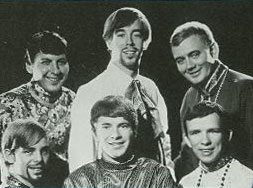
In the meantime, ABC had signed lead vocalist Donny Weaver to an individual contract, leaving Game Artists with a hit song and only a bass player to promote it. Undeterred, Adkins returned to Greensboro several months later and hand-picked some of the area’s finest musicians to tour as the O’Kaysions, including vocalist Donny Trexler, an ace guitarist who also sang with Bob Collins and the Fabulous 5. Trexler joined the band on guitar in December 1968 and became lead vocalist when Weaver left the following August. Dick Clark was none the wiser when he mimed the lead vocals to their hit record on Bandstand. In the interim, ABC had dropped the band and they signed with Atlantic, releasing one 45 (“Watch Out Girl”) on Cotillion Records. When it failed to chart, plans to release the O’Kaysions second album were shelved.
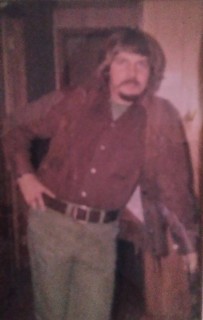
The Tropics were still a hot commodity and Adkins spent weekends on the road with the band, arranging bookings and making certain the group was on the bus and ready for the next gig. A near disaster happened when he was working with Griffin at Jokers Three. A promoter in Rockingham, N.C. had booked the Coasters to perform in the National Guard Armory, with the Tropics as their back-up band. Posters were printed and tickets sold, when the headliners called four days before the show and cancelled. Lee Dorsey and Major Lance were contacted but both had prior engagements. With time running out and hundreds of tickets sold, Adkins contacted a friend in Greensboro, Big Barbara. True to her name, Barbara was “a big girl with a big personality” and a great voice. After some coaxing, Adkins convinced her that the show could go on, if she agreed to take the stage as Barbara Lewis. Adkins explains that the ruse was plausible, since Lewis had never performed in the area and albums rarely featured the photos of black artists, “so nobody knew what she looked like.”
Big Barbara learned Lewis’ hits and was ready to perform when she had an attack of stage fright. The band plied her with a fifth of whiskey, “she gets drunk as hell; she gains tremendous courage; she goes out on that stage, struts her stuff and does a fabulous job and does Barbara Lewis to a T.” The audience loved it and were unaware that they had seen an impersonator.
But managing and performing soon became too much for Adkins, who decided to leave the road and concentrate on booking the Tropics and other bands. Adkins told the group he would continue to manage them, but would no longer travel with the band. But that was short-lived. Once Adkins left “there was nobody there to (prod) everybody to get up out of the hotel room and get in the bus” for their next performance. The band became frustrated with the set-up, so once Adkins quit, “within a month they all did, too.”
But Peters is more stoic about the break-up, pointing out that the band had been together for nearly a decade and members were growing weary of life on the road. “We were playing every night and a couple of us were married and a couple of us were thinking about getting married,” recalls Peters. He believes the “time had come when we were not committed 100% to the group” and it was time to move on. Jimmy and Arnold tried to convince Peters to join them as the entertainment for a cruise, but he declined.
Drummer Leonard Collins went on to play with the O’Kaysions and the Impressions.
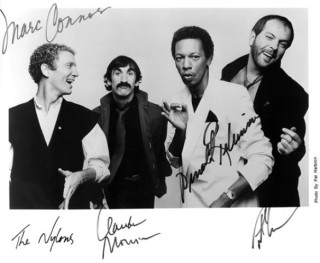
Arnold Robinson joined Sonny Turner’s Platters and later moved to Canada, where he was a founding member of the Nylons in 1979. The band achieved its greatest success in 1987, when their version of “Kiss Him Goodbye” reached #12 on the Billboard chart. Arnold recorded and toured with the internationally acclaimed a cappella group until his retirement in 2006. He died of complications from diabetes in 2013.
Leo Caudle went on to play with former members of the Swinging Medallions in Pieces of Eight, a band that had a minor hit in 1967 with “Lonely Drifter” on A&M Records. He also played tenor sax in Greenboro’s Kallabash Corporation. Larry Wren took his own life in the early seventies. Rick Sealey lives in High Point, but Parkinson’s disease has left him unable to play the guitar. Joe Frank Myers left for college after a few gigs and his whereabouts are unknown.
Malcolm Allen still lives in Leaksville and plays in his church. He headed the local NAACP chapter for more than a decade.
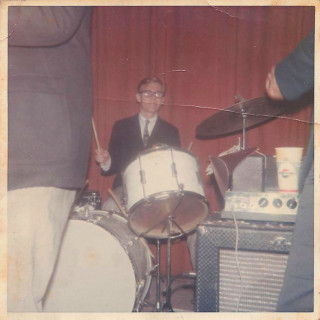
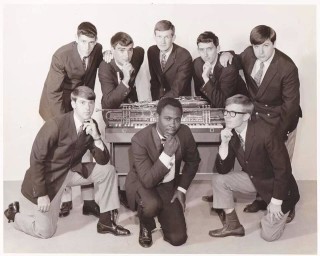
After leaving the Air Force, Red White returned to Rockingham County and drummed with the Tropics and the Impacts before joining another Jokers 3 band, Calvin Lindsay and the Hysterics. He moved to Beaufort, N.C. and now plays with the Outer Banks Philharmonic.
Mike Peters also lives at the beach but still plays his bass and joins Adkins for blues jams in Greensboro. Ken Adkins started his own business, Adkins and Associates, and has trained some of the top fashion headhunters in the country.
Jimmy Robinson left town and no one has heard from him since the band parted ways in 1969.
A revival of interest in the Tropics started in the early 80s, when Adkins began getting calls from Northern Soul fans in the UK who were looking for copies of the band’s record. Interest in the original 45 led to a reissue in 1987 by The Wax Museum, a Charlotte-based collector’s label. Adkins admits the band’s cult status caught him by surprise and says he “had no inkling” the record would garner attention six months after its release, much less 50 years after the fact. “When you’re going through a certain period of your life,” he says, “you never in a million years would guess that anybody would give a hoot about something you did when you were young.”
White shares Adkins surprise, but believes the Tropics have benefited from the trends that followed. With “disco and various fads,” he says “people began to get nostalgic for the old music.” But he believes the band has a far greater legacy than a chunk of vinyl. White is proud to have been a part of the first integrated band to perform in rural North Carolina. He believes that helped break down the color barrier by “setting a precedent” for generations that followed. “I was part of the original group that set that precedent for accepting a black musician and (going) on the road with a black musician,” White says.
While it’s been more than 50 years since the band first practiced in his father’s living room, Allen says he is still amazed at what they were able to accomplish. “We were just a small group of guys from the country, (but) were able to break down a lot of barriers because we all had a common goal and we all cared about each other, and we loved music.” And while the Tropics may have gone their separate ways, there was no turning back and the landscape of Rockingham County was forever changed.








Great success story. Thanks to Ken Adkins, now married to my niece for sending it to me.
Mike Peters and I worked at a local Reidsville NC radio station during our high school years. WREV was an AM/FM station and Mike and I worked the FM night shift primarily. The Tropics would frequently use the studio to practice during my shift. A great band with a great bunch of guys, several were my high school classmates, and lots of great memories from the Castaways. It was good to see Mike and Joe Myers at our 50 Year High School Reunion.
Larry,
I’m checking to see if this is the Larry Stone that stirred with us in Greensboro and CD, hanging out with the Shag Dance crowd.
Just wanted to publicly thank the AWESOME webmaster of this site! He helped me find a song from the Kavaliers I havent heard since the 60’s.It was my Mom’s favorite song,and she passed last year,so his finding that song for me was really special!!
I booked the Tropics for the Williams High School Junior Senior Prom in 1966 through Nat Harris ( my business partner for the last 40 years), and somehow General Norman Johnson was the guy I met at the Burlington YMCA to get the contract signed, and deliver the deposit check. The Tropics were terrific, and I have always wondered what happened to the members of the group. ” Hey you little girl” will always be a classic in my book! Jim Crouch
I was very glad to have found this site and specifically some history on Arnold Robinson. There is little out there on his life and times, even while spending 26 years with the Nylons and it seems his death was little memorialized which makes me sad for the legacy his wonderful voice left with us. I thank you for this interesting and informative trip through time and introducing me to the sounds of the Tropics, too. What a wealth of information you have here and so nicely documented!
Thanks for your kind comments. I have heard from a family member who expressed similar sentiments. Unfortunately, Arnold had passed when I began work on this article. He is truly missed and was a great talent.
That is unfortunate and I feel you’ve done a wonderful job for the blanks you’ve filled in!
Thanks you for your kind words. It was a labor of love.
Jack, this is a wonderful and completely masterful look at one of the bands from my younger years. I remember The Tropics as one of the most professional and highest quality bands of the south. In fact, they were one of the main inspirations I had in wanting to play in a band. It was always exciting to see their van parked at Betty Sue Trent’s shop. When it was there, I knew our local “stars” were inside. Thanks for this look at them and for the memories.
Thanks, Frank. Guitarist Ken Adkins was a wealth of information and provided many of the photos for the story. I remember Trent’s well and just wish now that I’d made more trips to go through their “old stock” 45s in the early 70s. The Tropics’ record stands out as one of the best of the era. It’s a shame they never made it back into the studio. Apparently they were too busy touring and backing up the headliners.
Many thanks for the comprehensive story of the group and the 45 Hey Little Girl…Owning the record is one thing but to read the group history with the trials & tribulations of the time interwoven in narrative makes it hit home how determined, talented and professional you all were…
Thanks for your kind comments. A great group for sure!
I saw the band in Bristol Va. in 1968. They were backing General Johnson and the Showmen. What a fantastic show!!
I rode with Mike Peters in his triump up to Sweet Brier college just to help out loading and unloading. Had a great time with him and the band. I’ll always remember that time.
Anyone got a copy of their Topic release, $$$$
Yes, it’s quite rare and fetches a high price, especially in the UK. There was a time when Trent’s Records in Reidsville, N.C. had dozens but that’s ancient history. Even the House of Wax reissue is difficult to find these days.
Thank you Jack, as you say not an easy one anymore
In the mid 1960’s I ran the Recreation Dept.’s swimming pool in Reidsville, NC. Mike Peters would come down and we’d hangout, sometimes riding around in the Triumph he owned. I knew all the band at that time, they played frequently at the Recreation Center and I worked there during those times. Jim Day was the Recreation Director for the City at that time when I played in a band with Lenny Stadler who later became the bass player for “Blackfoot”. Sometimes Jimmy, Mr. Day’s son, would sit in with us on drums when we practiced. (In later years while in the Shag Dance Contest crowd, people would brag about having a copy of the Tropics, “Hey You Little Girl”. Besides the organist with the band playing the trumpet at the same time occasionally, it wasn’t noted that Kenny Adkins played left handed with an upside down guitar from what I remember. We all, in bands in Reidsville, wanted to play like the Tropics at the time.
Thanks for the kind words, Ron. Unfortunately, I never got to see the Tropics perform; however, I did catch Lenny when he was playing bass with a contemporary Christian band at a Reidsville coffeehouse. I’m guessing this was in the mid-70s before Blackfoot. The group was called Shoshannah, although I’m not sure about the spelling. Our bass player was a friend of Lenny’s and had their LP. He was an amazing musician. Ken Adkins is still playing guitar.
I have a 33 LP record pressed by Ohio Recording Service of Toledo, OH…super covers of Blue Velvet, Monkey Time by Major Lance..I got a woman way across town, talk to me, im so glad you’re mine..turn on your love light, let it shine on me..you are my sunshine..Hey Little Girl (alternate version) mentions dances like the twist snd watusi…in really great condition, groovy thrift shop find!!
Follow up to previous post- the record label reads “The Tropics – Limited Edition” no song titles on lables… looks circa mid 1960s